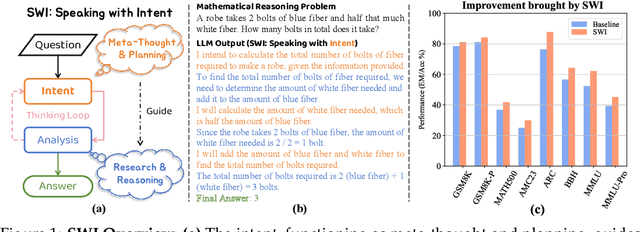SWI: Speaking with Intent in Large Language Models
Paper and Code
Mar 27, 2025



Intent, typically clearly formulated and planned, functions as a cognitive framework for reasoning and problem-solving. This paper introduces the concept of Speaking with Intent (SWI) in large language models (LLMs), where the explicitly generated intent encapsulates the model's underlying intention and provides high-level planning to guide subsequent analysis and communication. By emulating deliberate and purposeful thoughts in the human mind, SWI is hypothesized to enhance the reasoning capabilities and generation quality of LLMs. Extensive experiments on mathematical reasoning benchmarks consistently demonstrate the superiority of Speaking with Intent over Baseline (i.e., generation without explicit intent). Moreover, SWI outperforms answer-trigger prompting methods Chain-of-Thought and Plan-and-Solve and maintains competitive performance with the strong method ARR (Analyzing, Retrieving, and Reasoning). Additionally, the effectiveness and generalizability of SWI are solidified on reasoning-intensive question answering (QA) and text summarization benchmarks, where SWI brings consistent improvement to the Baseline generation. In text summarization, SWI-generated summaries exhibit greater accuracy, conciseness, and factual correctness, with fewer hallucinations. Furthermore, human evaluations verify the coherence, effectiveness, and interpretability of the intent produced by SWI. This proof-of-concept study creates a novel avenue for enhancing LLMs' reasoning abilities with cognitive notions.
 Add to Chrome
Add to Chrome Add to Firefox
Add to Firefox Add to Edge
Add to Edge